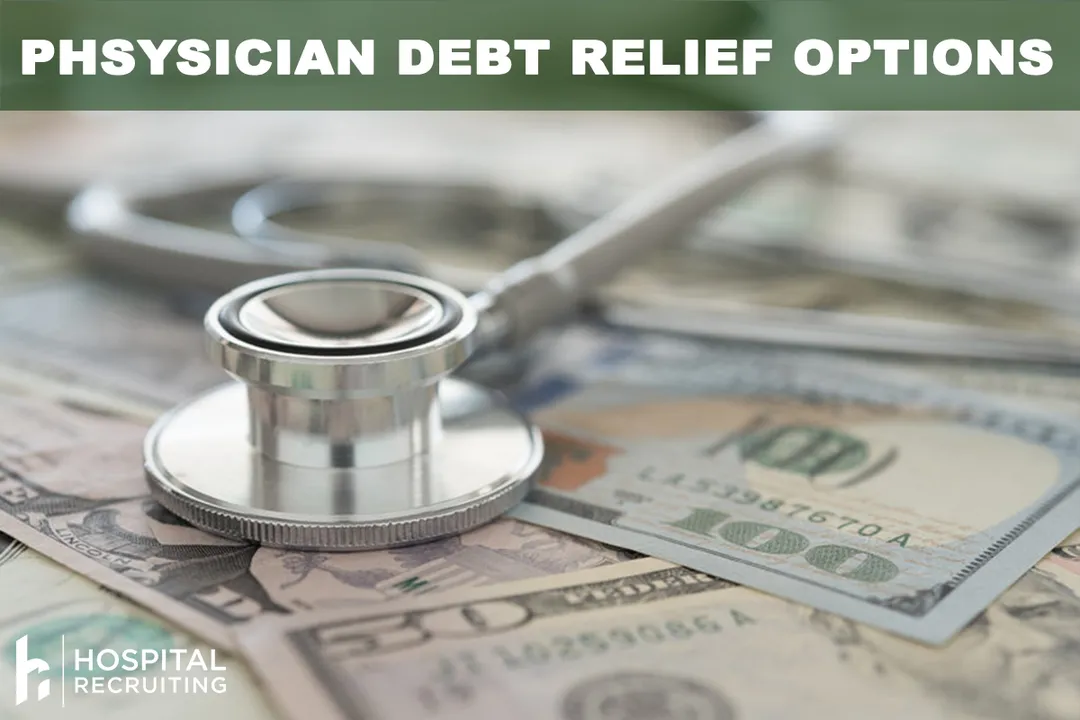Established and Proven Options for Alleviating Medical Education Debt

Are you sitting down? The average residency graduate has around $250k in medical school and/or education debt. Yes, a quarter of a million dollars! The constant rise in medical school tuition costs is not commensurate with wannabe-doctors’ ability to pay. Generous federal graduate student loan programs have enabled students from non-wealthy backgrounds to pursue their dreams of becoming physicians. Unfortunately for borrowers during the early 2000s and 2010s, these loans came with hefty interest rates.
Student loan burden in the US has been the subject of lots of media attention of late and is a contentious topic, given that many proponents of loan forgiveness feel the government is not doing enough to alleviate this massive financial burden facing millennials (and soon, gen z-ers). Others feel that when a person signs a contract to borrow money, he/she is responsible for paying off the loans no matter what.
It would be hard to find a physician or allied healthcare professional who didn’t feel that the debts taken on for medical training should be treated with a certain degree of leeway, given that physicians sacrifice decades of their lives for training purposes, ultimately benefiting humankind. In that vein, there are established and proven ways of alleviating student debts for physicians, during and after residency.
Payoff versus Forgiveness
The main question one must ask before embarking on this decision-making process is: do you want to hurry and pay off every cent of your loan on your own, with your earnings, in order to make the debt go away and move on with your life? Or do you want to play the long game and bide your time, follow a strictly defined set of rules, and ultimately qualify for loan forgiveness? This is the first main fork in the road in terms of where you will direct your energy in finding financial solutions during the job search. For more information regarding the in’s and out’s of this set of options, check out sites like NerdWallet or White Coat Investor.
Federally serviced loans
The best option for those of us who exclusively hold government-issued education loans is to keep those loans within the federal loan system with the goal of forgiveness. That is, if you are willing to work in a 501c-3 (nonprofit) institution for the duration of the time that it takes to accrue the 120 required payment months. While Fed loans are unfortunately subject to a locked-in, higher interest rate as compared to many private loan servicers, it is the only loan servicer that is associated with both the income-driven repayment plans (PAYE, IBR) and the only one that will allow for forgiveness via the PSLF system. Most hospitals in the US are non-profit, and therefore staying within a hospital system is a surefire way to rack up those months and stay on track to your goal of forgiveness. While the PSLF system does not have the greatest reputation for ease of application or success rates for forgiveness, it does seem like recent efforts in Washington to smooth out this process may be taking effect in coming years. I am not, unfortunately, talking about blanket loan forgiveness. But biding your time within PSLF will certainly be worth it, if you are willing to put in the time and live with a high balance on your loan in anticipation of that eventual forgiveness.
Job offers that include high dollar amount repayment incentives might not be the best option in this case, since the amount of money repaid is not the priority in PSLF cases; rather, it is the time put into repayment with consistent and on-time payments for the 120 months.
Private loans
Some graduating residents carry loan burden from both undergraduate/ graduate and medical school. This can amount to dizzying balances that may feel unsurmountable. In cases where some or all of the loan is held by private servicers, the appeal of consolidation and refinancing could be worth your consideration. Interest rates since the beginning of 2020 have been incredibly low, making refinancing more affordable for borrowers. Whether or not you have refinanced or consolidated, it’s important to consider repayment offers when looking for jobs within private practices or other larger groups that do not fall under the “nonprofit” umbrella. For-profit entities are able to use their capital to appeal to younger physicians. This works in everyone’s favor, since practices will get a tax benefit from offsetting their employees’ student debts, and they will in turn be able to pay new physicians much lower salaries as compared to a more seasoned doctor. Shaving numbers off one’s loan balance will also help borrowers, whose monthly payments can also go up with a salary that has a few extra zeros as compared with residency salary. Overall, this is great for those of us who are interested in repayment on our entire loan balance as fast as possible. Depending on how parsimonious you are in life, and how many other financial obligations you have, even the steepest loan balances can be conquered in a few years. It’s worth asking upfront when searching for jobs or pursuing informational interviews if there is a student loan repayment incentive, how it is structured, and whether there is a minimum number of years worked in order to qualify for or receive the total promised amount.
Conclusion
There is no two ways about it: student loans are a huge burden, no matter how financially lucrative your attending position may be. During training, and in the first years out in practice, payoff or forgiveness will be a top priority for many young physicians. This is the unfortunate cost of following your dream in the US at present. However, there are manageable ways of working with the debt so that a financially-free future is within reach.
Related Posts
